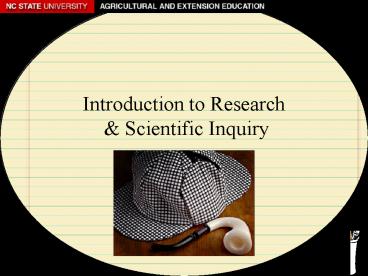Introduction to Research - PowerPoint PPT Presentation
1 / 23
Title:
Introduction to Research
Description:
Introduction to Research & Scientific Inquiry What is Research? research is an unusually stubborn and persisting effort to think straight which involves the gathering ... – PowerPoint PPT presentation
Number of Views:426
Avg rating:3.0/5.0
Title: Introduction to Research
1
Introduction to Research Scientific Inquiry
2
What is Research?
- research is an unusually stubborn and persisting
effort to think straight which involves the
gathering and the intelligent use of relevant
data
H. M. Hamlin, What is Research? American
Vocational Journal, September 1966.
3
Origin of the Word Research
- From the French word "recherche" which means to
travel through or survey
4
How do we know what we know and why do we do
what we do?
- Personal Experience (Sensory Experience)
- Our personal experiences are limited
- We may be mistaken in our observations
- We may fail to see things clearly because of our
biases
5
The Fallacy of Personal Experience
- You might have eaten some type of food and got
sick. Therefore, you never eat this food again
because it makes you sick.
6
Example The Case Against Bread
- More than 98 of convicted felons are bread
users. - Fully half of all children who grow up in bread
consuming households score below average on
standardized tests. - In the 18th century, when virtually all bread was
baked in the home, the average life expectancy
was less than 50 years. - More than 90 of all violent crimes are committed
within 24 hours of eating bread. - Primitive tribal societies that have no bread
exhibit a low incidence of cancer, Alzheimer's,
and Parkinson's disease.
7
Is it True?
- Do women make nicer bosses?
- How would you know?
- How could you test this idea?
8
How do we know what we know and why do we do
what we do?
- Tradition (Agreement with Others)
- Advice, rules, and approaches to handling
problems are passed from year to year and
accepted as truth - Reliance on tradition eliminates the need to
search for knowledge, makes accepting new
knowledge difficult, and mitigates our desire to
question existing practice.
9
Example The Fallacy of Tradition
- Trees for building purposes should be felled in
December. - When transplanting a tree, be careful to have the
same side facing the south. - Wood from a tree struck by lightning should never
be used in the construction of a house, or barn,
or they in turn may also be struck by lightning. - Rain drops on a child under a year will cause
freckles.
10
How do we know what we know and why do we do
what we do?
- Authority (Expert Opinion)
- Authorities can be wrong, and the public has a
tendency to accept as fact what are actually
opinions.
11
Example The Fallacy of Authority
- In 1992 the Catholic Church reversed their
decision charging Galileo with heresy. He had
claimed the earth was round and revolved around
the sun, which went against the teachings of
the church.
12
Logic
- All human beings are mortal
- Sally is a human being
- Therefore, Sally is mortal
13
Research (The Scientific Method)
- In contrast to sources of knowledge that are
primarily idiosyncratic, informal, and influenced
heavily by subjective interpretations, research
involves a systematic process of gathering,
interpreting, and reporting information.
14
The Scientific Method
- Testing ideas in the public arena by formulating
a hypothesis (a tentative, testable assertion
about certain behaviors, phenomena, or events)
within a rigorous format. - Must be reproducible and described in sufficient
detail through 5 distinct steps - State the problem
- Define the purpose of the study
- How to gather the information
- How to organize and analyze the information
obtained - How the information is interpreted
15
Ways of Knowing
16
Two Approaches to Research
- Quantitative
- Emphasizes numbers, measurements, control, and
experimentation - This is the traditional approach in AEE research
- Qualitative
- Emphasizes natural settings, observations, verbal
narratives, and interpretations - Emerged in the mid-1970s as an approach to
educational research
17
Goals
- Quantitative
- Test theory
- Establish facts
- Show relationships
- Predict
- Statistically describe
- Qualitative
- Understand theory
- Develop understanding
- Describe multiple realities
- Capture naturally occurring behavior
18
Which Approach is Best?
- The problem you are studying determines which
approach to take. - One is not better than the other.
- However, some researchers tend to look down their
nose at the qualitative researcher!
19
Mixed Methods
- Some researchers used both qualitative and
quantitative methods in a single study. This is
known as a mixed method approach.
20
Which Would You Select?
- Pillbugs are taking over parts of my garden and
are becoming a problem! - Get with a group of 4 and quickly design a study
to investigate this problem. - Decide whether to approach this problem
quantitatively or qualitatively (or mixed) - Tell what you would do and why
- What are the advantages and disadvantages of your
approach
21
The QUESTION you are attempting to answer
- Why are pillbugs found in such high quantities in
parts of my garden? - Design your experiment to test something about
what pillbugs like/dont like
22
Pillbug Inquiry Lab
- You and your partner are to take the ideas you
just generated and turn it into a TESTBALE
hypothesis (define the purpose). - Take a look at the available supplies for ideas
- Is there something else you need?
23
Pillbug lab cont.
- What are you going to test? What is your
control? - What data are you collecting? Which type and how
is it organized? - What will you be able to conclude? How certain
can you be?































